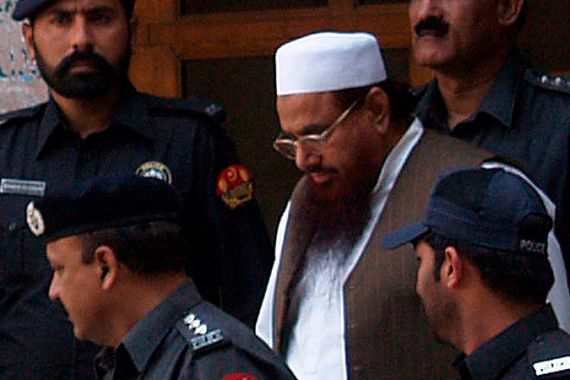Hafiz Saeed rejects US terrorism accusations
Jamaat-ud-Dawa chief blamed for Mumbai attacks tells Al Jazeera his opposition to NATO supply lines led to $10m bounty.

Hafiz Saeed, the leader of a Pakistan-based group blamed for the 2008 attacks on Mumbai, has demanded proof after the US announced a $10m bounty on his head.
In an exclusive interview with Al Jazeera, Saeed said the US move was prompted by the fact that he had been organising rallies against the re-opening of supply lines through Pakistan to NATO forces in Afghanistan.
“We are not hiding in caves for bounties to be set on finding us,” Saeed said. “I think the US is frustrated because we are taking out countrywide protests against the resumption of NATO supplies and drone strikes.
“I believe either the US has very little knowledge and is basing its decisions on wrong information being provided by India, or they are just frustrated”.
US Under Secretary of State Wendy Sherman, on a visit to India, said a $2m bounty had also been announced for Abdul Rahman Makki, Saeed’s brother-in-law and the group’s second-in-command.
Rewards for Justice, a programme sponsored by the US State Department, announced the cash reward for the 62-year-old Saeed on its website.
“Saeed is suspected of masterminding numerous terrorist attacks, including the 2008 Mumbai attacks, which resulted in the deaths of 166 people, including six American citizens,” the page said.
Lashkar-e-Taiba (LeT), designated as a terrorist organisation by the US in December 2001, is accused by India of carrying out several attacks besides the one on Mumbai.
LeT is the military wing of Saeed’s larger organisation, Jamaat-ud-Dawa, which is also blacklisted by the US.
Ajmal Kasab, the only surviving gunman involved in the three-day rampage in November 2008, has been sentenced to death by an Indian court.
Kasab accused Saeed of organising the attack, which involved 10 gunmen, nine of whom were killed during the shootout.
‘Popular man’
India welcomed the move as a reflection of the commitment by India and the US “to bring perpetrators of the Mumbai terrorist attacks” to justice.
| Mumbai Attacks | ||||||||||
|
“[The bounty] sends a strong signal to Lashkar-e-Taiba as also its members and patrons that the international community remains united in combating terrorism,” Syed Akbaruddin, spokesman for India’s ministry of external affairs said on Twitter.
Al Jazeera’s Kamal Hyder, reporting from Lahore, where Saeed is believed to be based, said Pakistan was pressured to ban Saeed’s organisations after the US invasion of Afghanistan. .
“He started a foundation, and his men played a key role in aid efforts after earthquake in Kashmir, and the floods in Pakistan. They still are the main frontline in any calamity. He has denied that he has any links to militancy,” our correspondent said.
“A man who is popular across the country – it’s not going to go down very well. It is also symbolic that the annoucment came in India, by a high-ranking US diplomat. That will be an irritant.”
Sreeram Chaulia, a professor at India’s Jindal School of International Affairs, said Saeed was “intrinsically linked” to Pakistan’s spy agency.
“The Pakistan establishment will not hand him over for the bounty, and any private citizen who tries to make cash through tipping off the Americans will be targeted,” Chaulia told the AFP news agency.
“I don’t think extradition is any possibility,” Ayesha Siddiqa, an Islamabad-based defence analyst, told Al Jazeera. “Basically, the watch list doesn’t mean anything. [Saeed] is just one of many people being watched.”
The announcement comes as Asif Ali Zardari, Pakistan’s president, is due to visit India for the first time since the attacks in Mumbai.
The bounty on Saeed, equivalent to that on Afghan Taliban leader Mullah Omar, is second only to the $25m bounty on Ayman al Zawahiri, who succeeded Osama bin Laden as the al-Qaeda chief.
Saeed is the fifth Pakistani national on the list.